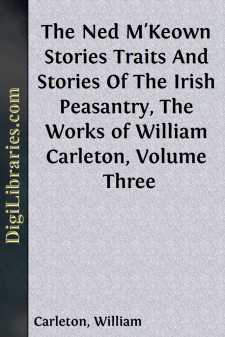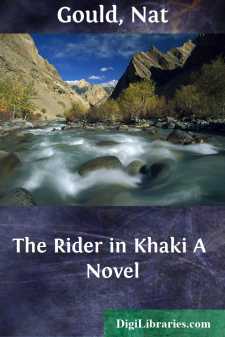Literary Collections
- American 84
- Ancient, Classical & Medieval 14
- Asian 1
- Australian & Oceanian 1
- Canadian 55
- Continental European 121
- English, Irish, Scottish, Welsh
- Essays 160
- General 24
- Letters 46
- Middle Eastern 1
English, Irish, Scottish, Welsh Books
Sort by:
by:
William Carleton
INTRODUCTION. It will naturally be expected, upon a new issue of works which may be said to treat exclusively of a people who form such an important and interesting portion of the empire as the Irish peasantry do, that the author should endeavor to prepare the minds of his readers—especially those of the English and Scotch—for understanding more clearly their general character, habits of thought,...
more...
by:
George Gissing
CHAPTER I In the troubled twilight of a March evening ten years ago, an old man, whose equipment and bearing suggested that he was fresh from travel, walked slowly across Clerkenwell Green, and by the graveyard of St. James's Church stood for a moment looking about him. His age could not be far from seventy, but, despite the stoop of his shoulders, he gave little sign of failing under the burden...
more...
by:
Wilkie Collins
FIRST SCENE.—The Cottage on the Frontier.PREAMBLE.THE place is France. The time is autumn, in the year eighteen hundred and seventy—the year of the war between France and Germany. The persons are, Captain Arnault, of the French army; Surgeon Surville, of the French ambulance; Surgeon Wetzel, of the German army; Mercy Merrick, attached as nurse to the French ambulance; and Grace Roseberry, a...
more...
by:
George Gissing
THE FOLD AND THE SHEPHERD 'So to-morrow, Alice,' said Dr. Madden, as he walked with his eldest daughter on the coast-downs by Clevedon, 'I shall take steps for insuring my life for a thousand pounds.' It was the outcome of a long and intimate conversation. Alice Madden, aged nineteen, a plain, shy, gentle-mannered girl, short of stature, and in movement something less than graceful,...
more...
by:
George Gissing
CHAPTER I It was Mumford who saw the advertisement and made the suggestion. His wife gave him a startled look. 'But—you don't mean that it's necessary? Have we been extrav—' 'No, no! Nothing of the kind. It just occurred to me that some such arrangement might be pleasant for you. You must feel lonely, now and then, during the day, and as we have plenty of room—'...
more...
by:
William Carleton
THE POOR SCHOLAR. One day about the middle of November, in the year 18—, Dominick M'Evoy and his son Jemmy were digging potatoes on the side of a hard, barren hill, called Esker Dhu. The day was bitter and wintry, the men were thinly clad, and as the keen blast swept across the hill with considerable violence, the sleet-like rain which it bore along pelted into their garments with pitiless...
more...
INTRODUCTION Gay's concern in his survey of The Present State of Wit is with the productions of wit which were circulating among the coffee-houses of 1711, specifically the large numbers of periodical essays which were perhaps the most distinctive kind of "wit" produced in the "four last years" of Queen Anne's reign. His little pamphlet makes no pretence at an analysis of true...
more...
TO THE QUEEN. MADAM, I have the honour to place in your Majesty's hands the hitherto uncollected and unpublished Prose Works of WILLIAM WORDSWORTH —name sufficient in its simpleness to give lustre to any page. Having been requested thus to collect and edit his Prose Writings by those who hold his MSS. and are his nearest representatives, one little discovery or recovery among these MSS....
more...
by:
Nat Gould
CHAPTER I "WILL HE MARRY HER?" "Do you think he will marry her?" asked Harry Morby. "Does anybody know what he will do," replied Vincent Newport, discussing their host Alan Chesney, of Trent Park, a beautiful estate in Nottinghamshire, close to the Dukeries, Sherwood Forest, and the picturesque village of Ollerton. In the billiard room they had just finished a game of a hundred...
more...
INTRODUCTION ‘Lavengro’ and ‘The Romany Rye’ are one book, though the former was published in 1851 and the latter not until 1857. After a slumber of six years the dingle re-awakes to life, Lavengro’s hammer shatters the stillness, and the blaze of his forge again lights up its shadows, while all the strange persons of the drama take up their parts at the point where the curtain had been so...
more...











